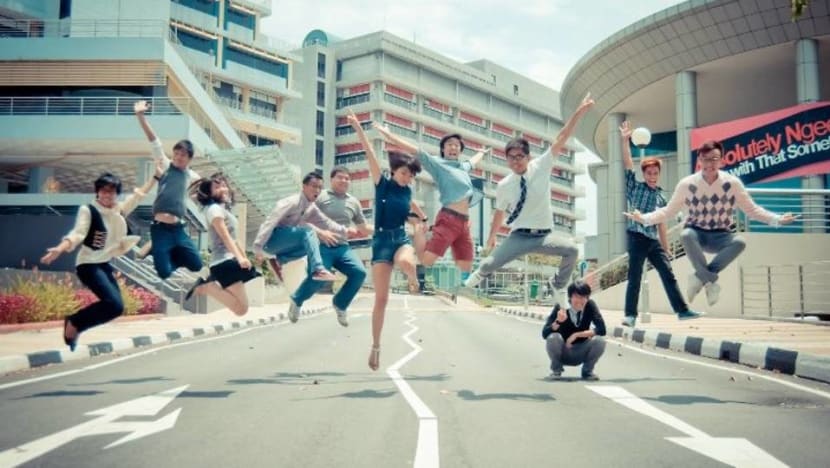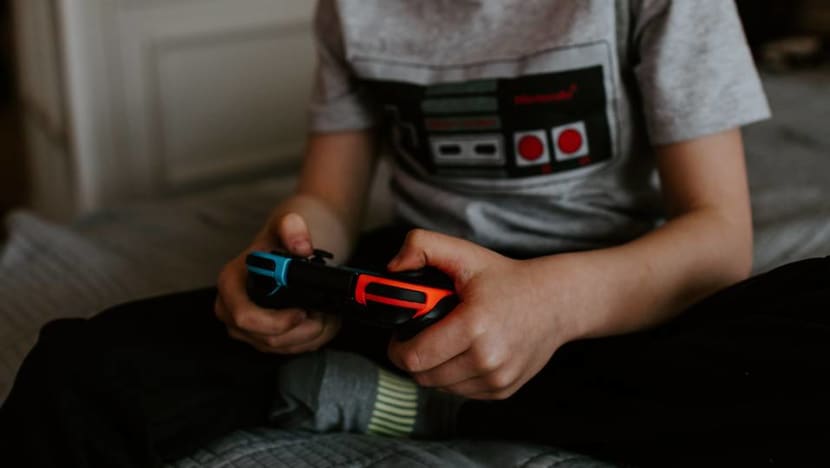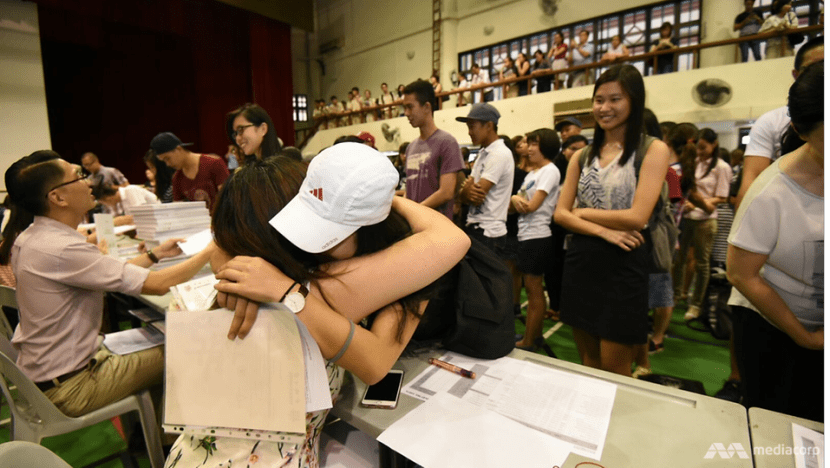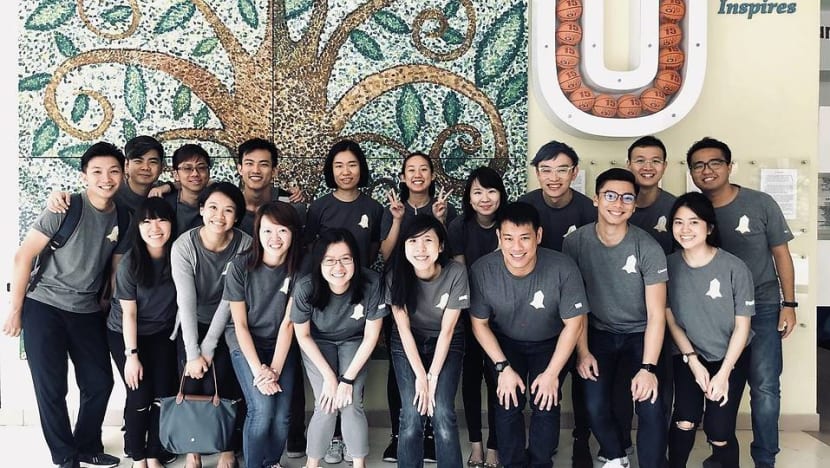commentary Commentary
Commentary: How I picked up the pieces after failing my A-Level exams
While his peers at a top junior college were looking at a string of As, Marvin Kang was the rare exception with a slew of Ds. Yet, that led to some of the best things that happened to him.

The writer with his friends from Ngee Ann Polytechnic. (Photo: Marvin Kang)
SINGAPORE: I will always remember that moment when I received my A-Level result slip nearly 20 years ago. I stared hard at my grades - D, D, S.
Oddly, it did not strike me immediately that I had failed my A-Level exams.
Perhaps it was my teacher’s calm tone or my exhaustion after spending the first 10 days at Basic Military Training (BMT).
Perhaps, I simply could not bring myself to face reality. After all, I had a smooth educational journey until this point – did well enough to get into Catholic High School and then to Raffles Junior College.
This probably lulled me into thinking I could somehow get to university. Which is why during National Service (NS), I continued to apply for courses at local universities, hopeful that I would get a place.
READ: Commentary: Life Beyond Grades a worthy cause but be careful not to trivialise failure
READ: Commentary: PSLE scores and the problem with the beloved late bloomer narrative
With every passing rejection, I eventually accepted that my results spelt the end of my education journey.
After NS, I worked at ice cream shops and at a customer service centre, but those stints lasted only for a few months. Soon, I found myself spending the bulk of my time at home playing computer games.

I would play Diablo through the night alongside American players (it was daytime for them) and slept in the day instead. My mum and friends encouraged me to play less, but not knowing what I else I could do, I ignored them.
Before I knew it, the initial months of gaming became a three-year addiction.
PICKING UP THE PIECES AT POLYTECHNIC
One day, I accepted an invitation from a friend to attend the open house of a polytechnic. I was 24 but after that visit, I decided I would enrol in a course. I didn’t know it then, but looking back now, that was the start of my recovery that would end up with me getting a government scholarship.
The key turning point in my recovery was to come to terms with my gaming addiction. While I was aware that I was spending a lot of time playing computer games, I did not realise that gaming had become my way of avoiding the difficult issues I faced.
Was I prepared to stop studying and find a job since I was sure that no local university would accept me? What were the jobs that I could get with a bare minimum A-Level certificate? Should I enrol in a private degree programme? Can I afford it? The more I gamed, the less I needed to deal with these questions.
READ: Commentary: PSLE scores could impact life outcomes. So don’t let them
It took a bad case of hyperventilation for me to start noticing that something was wrong. One night while gaming, I realised that I made an irrecoverable mistake that effectively wasted two weeks of painstaking efforts.
I shut down my laptop, laid down on my bed and began to feel angry with myself for the mistake. As I got increasingly upset, I also began to ask myself how I had allowed a game to take over my life, making me feel so emotional when things went wrong.
But that extreme reaction to what was a small matter made me realise something was very wrong. After that night, I started to cut down on my gaming hours from more than 12 hours a day to six. As my preoccupation with the game lessened, those difficult issues about my next steps became more salient.
READ: Commentary: Limits on video gaming the heart of a growing controversy in Japan
READ: Commentary: Singapore's Sea is world's best performing stock. And it can do better
Gaming addictions are tough to come to terms with. You may be addicted if playing games is persistently affecting your daily activities.
While there are no official statistics on gaming addiction in Singapore, a global study done by Limelight Networks in January 2020 across nine countries and 4,500 respondents found that nearly 60 per cent of Singaporean respondents had foregone sleep and 13 per cent had missed work to play games.
Lesson number one: A gaming (or any) addiction could be a sign of deeper issues and if you are skipping work or sleep to play, it needs attention.
WALKING AN UNFAMILIAR PATHWAY
Being in Junior College, I was only exposed to one fixed path – go to university and find a suitable office job. So when my friends suggested I try going to a polytechnic, I wasn’t keen. Apart from unfamiliarity, I was also worried that I would not fit in well with the other students, as I would be about seven years older than most of them.
Yet, that day, walking around Ngee Ann Polytechnic (NP) was sobering. Seeing students rush for classes, friends chilling out and chatting happily over lunch, and passionate interest groups share about their causes was a kick-in-the-butt moment, rekindling in me a desire to do something and move forward in life.
That very afternoon, I decided to enrol in NP.

My NP experience was pivotal in starting my recovery. Getting back to doing well academically was a key part of my recovery too because it gave me back my self-esteem which had taken quite a beating after JC.
Doing well enough to get a scholarship and go to university, seeing my mother tear when I received academic awards made me realise I could still provide for my family and do them proud.
Had I dismissed the polytechnic option, I may very well still be preoccupied with throwing fireballs and teleportation in the fantasy world.
Lesson number two: Be open to paths you never considered before.
CONTRIBUTING TO A LARGER CAUSE
While going to NP was probably one of the best things that happened to me, polytechnic life was not a bed of roses.
At the back of my mind was a constant refrain that this was my “last chance” to make amends. I was constantly afraid that I was not doing well enough. More than once, I had thought of giving up.
But it was what happened outside the classroom that saved me from my own worst instincts. During my first year, I became active in a student interest group called BA_Comm.
We tried to help fellow students from the School of Business and Accountancy (BA) improve their communication skills and build confidence.

On days when things went wrong and I felt down, I would look forward to working on BA_Comm matters. It felt meaningful and made me happy.
Over the years, contributing to larger causes like this helped me to zoom out and reduce focusing on myself, putting into perspective my issues of self-doubt and insecurity. A larger cause does not need to be something grandiose-sounding like “eradicating poverty”; my work in BA_Comm certainly was not about saving the world.
This spirit of contributing to larger causes is similar to how students participate in service-learning projects, which many studies have found can help students develop stronger civic engagement and social skills.
READ: The Big Read: Singapore's oft-maligned millennials face their first crisis
Contributing to causes I find meaningful has also connected me with a larger community of like-minded friends, many of whom are my closest friends today. In many cases, working on these causes acted as a form of career exploration that helped inform our subsequent career decisions and expanded our options for meaningful careers.
Years later, it was this experience that contributed to a group of us starting a non-profit volunteer initiative to help youths with their career exploration.
We named this non-profit initiative The Astronauts Collective (TAC), in hopes that we can all help younger versions of ourselves be like astronauts - courageous and open-minded in exploring the world of work and finding meaningful careers, especially in a challenging period like this.
Lesson number three: Take away the focus on yourself, do something that contributes to others too.
This year, I have made yet another significant change in my life.
After spending six years in the civil service, I have decided to take a year off to work full-time on TAC. 2020 has been tough but also exceptional in showing me that our journeys are never fixed nor pre-determined and there can be huge bumps along the way.
My hope is that with this new phase of my life, I can help others, who like me nearly 20 years ago, felt like they had nowhere to go.
Marvin Kang is co-founder of The Astronauts Collective, a non-profit volunteer initiative that aims to help youths explore and find meaningful careers.
Marvin was also one of three working adults who revealed how their PSLE results shaped their life journeys in a no-holds-barred conversation on CNA's Heart of the Matter podcast:














